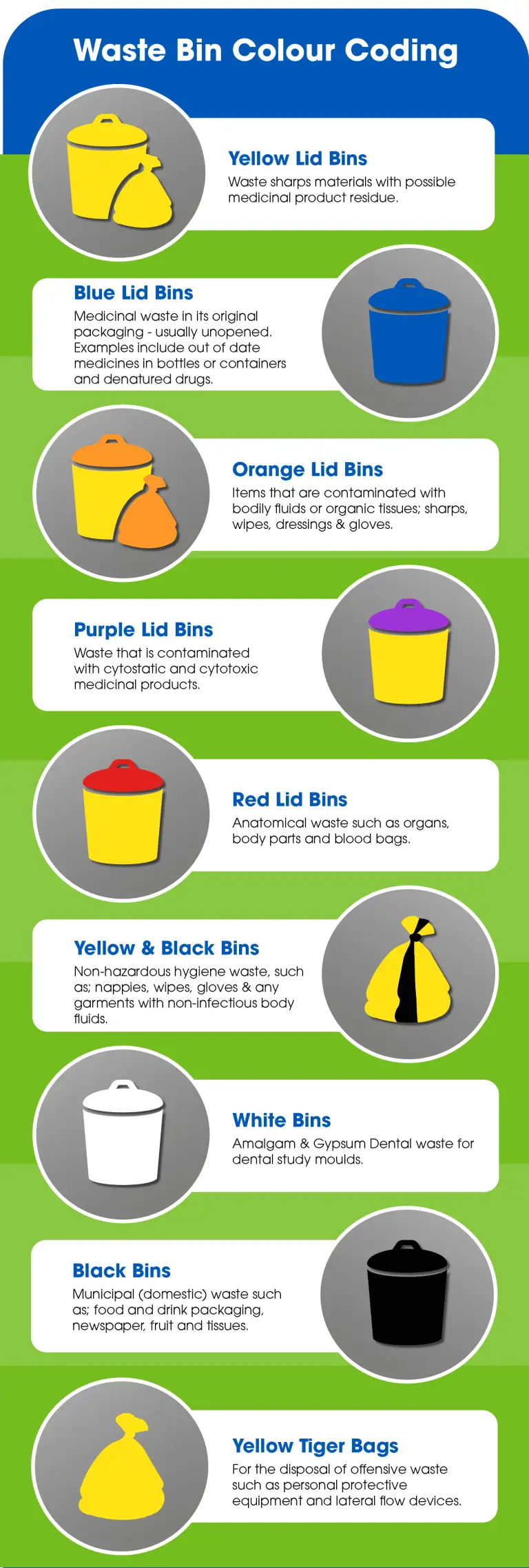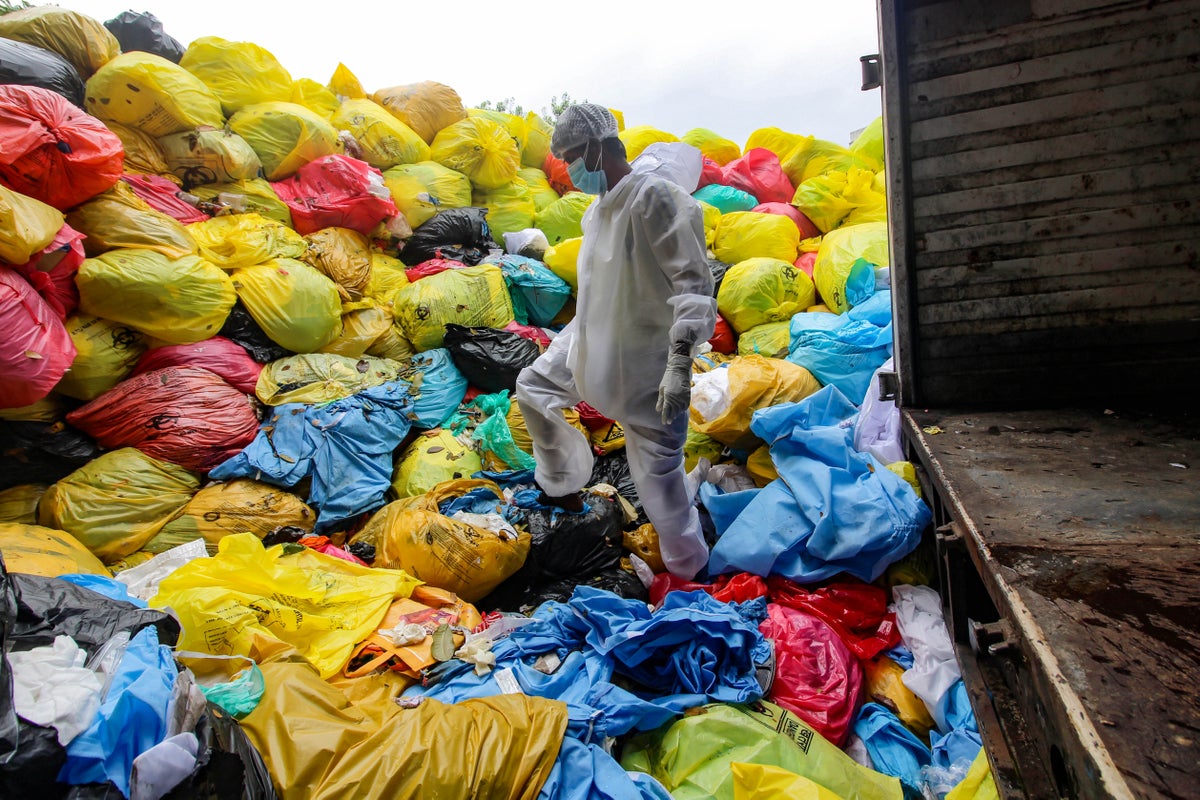Tailored Medical Waste Disposal Service: Meeting Health Care Conformity Standards
Wiki Article
Guaranteeing Safe Handling and Disposal of Medical Waste
Making sure risk-free handling and disposal of clinical waste is of extremely important relevance in medical care setups. Improper monitoring of clinical waste can pose substantial risks to the atmosphere, public health, and healthcare employees. This necessitates adherence to stringent guidelines and methods for its safe handling and disposal. In this intro, we will certainly discover the significance of correct clinical waste monitoring, the dangers connected with improper handling and disposal, along with the guidelines and approaches that can be applied to guarantee its risk-free disposal. Additionally, we will certainly talk about the relevance of training and education and learning for health care experts in order to maintain a secure and clean medical care setting. By complying with these techniques, we can successfully mitigate the possible threats related to clinical waste.Significance of Correct Medical Waste Management
Correct clinical waste administration is of utmost importance in making certain the security and health of health care professionals, clients, and the basic public. Clinical waste refers to any kind of waste produced by medical care facilities during the diagnosis, treatment, or booster shot of pets or human beings. This waste can present major wellness risks if not taken care of and disposed of effectively.
One of the main reasons appropriate clinical waste management is important is to avoid the spread of transmittable diseases. Medical waste, such as utilized needles, contaminated dressings, and organic products, can carry dangerous virus. If not handled and dealt with properly, these microorganisms can be sent to health care employees, patients, waste handlers, and even the public, resulting in the possible episode of conditions.
Additionally, proper medical waste administration aids protect the environment - medical waste disposal. Clinical waste consists of harmful materials, consisting of chemicals, pharmaceuticals, and contaminated materials. When not managed suitably, these substances can pollute dirt, water bodies, and the air, posturing a significant danger to ecosystems and public health
Additionally, effective medical waste management makes sure compliance with regional policies and international standards. Governments and regulatory bodies have actually developed procedures and standards to make sure the risk-free handling, storage, transportation, and disposal of medical waste. Complying with these laws is vital to avoid lawful consequences and keep the credibility and reputation of medical care centers.
Risks of Improper Handling and Disposal

Clients can additionally be exposed to these transmittable conditions if medical waste is not effectively taken care of. For example, if polluted needles or various other sharps are not disposed of in designated puncture-proof containers, they may unintentionally puncture individuals, bring about possible infections. Additionally, if medical waste is not segregated correctly, there is a danger of cross-contamination between different sorts of waste, additional boosting the opportunities of illness transmission.
Inappropriate disposal of clinical waste can likewise have harmful impacts on the atmosphere and the general public. If medical waste is not dealt with and disposed of appropriately, it can infect water sources, soil, and air, bring about the spread of diseases and pollutants. This can have long-term effects on communities and public wellness.
Standards for Safe Handling of Medical Waste
Executing effective procedures for the safe handling of medical waste is essential in making certain the security of healthcare specialists, clients, and the public. These standards are essential in minimizing the threats associated with the handling and disposal of clinical waste, such as infections, injuries, and ecological pollution.Firstly, healthcare centers must establish an extensive waste monitoring plan that sticks to regional, national, and worldwide laws. This plan must include clear guidelines on waste segregation, packaging, storage space, labeling, and transportation. It is important to separate various sorts of waste, such as sharps, transmittable products, drugs, and non-hazardous waste, to prevent cross-contamination and promote risk-free disposal.
In addition, health care personnel should obtain complete training on correct waste handling techniques. They need to be educated on the prospective dangers of clinical waste, the appropriate use of personal protective devices (PPE), and the right treatments for managing, transporting, and disposing of different kinds of waste.
Additionally, health care centers ought to on a regular basis check and examine their waste monitoring practices to make sure conformity with standards. This consists of performing routine assessments, evaluating waste handling treatments, and supplying responses and training to team member.
Effective Strategies for Waste Disposal
To ensure the secure handling and disposal of medical waste, it is important to use efficient techniques for waste disposal. Clinical waste can position significant threats to public health and the atmosphere if not handled and taken care of correctly. For that reason, medical care centers and waste monitoring organizations should implement ideal methods to alleviate these risks.One effective approach for garbage disposal is segregation. It entails separating various types of clinical waste based on their characteristics. Partition allows for the proper therapy and disposal of each waste classification, decreasing the possibility for contamination or damage. Medical care centers ought to provide clear guidelines and training to team member on how to segregate waste appropriately.

Moreover, health care centers must collaborate with qualified waste administration business to ensure correct disposal of medical waste. These companies have the competence and tools needed to securely handle and dispose of medical waste in conformity with guidelines and ideal practices.
Training and Education for Health Care Professionals
Healthcare professionals play a critical function in guaranteeing the safe handling and disposal of medical waste through comprehensive training and education. It is necessary for doctor to have a deep understanding of the possible threats connected with clinical waste and the proper methods for its monitoring. By getting appropriate training, healthcare specialists can decrease the potential transmission of transmittable illness, stop environmental contamination, and protect both themselves and the general public.
Furthermore, training programs need to emphasize making use of individual protective devices (PPE) and proper hand health techniques when managing medical waste. medical waste removal service. Medical care professionals need to know exactly how to appropriately get rid of and utilize of PPE to protect themselves from prospective direct exposure to unsafe materials. They ought to additionally be informed on the relevance of regular handwashing and the proper use hand sanitizers to decrease the spread of transmittable illness
Continuing education and learning and regular updates on clinical waste administration practices are essential for health care specialists. As regulations and guidelines progress, it is necessary to keep health care service providers educated regarding any type of adjustments in methods and best practices. This will ensure that they stay updated and preserve a high requirement of safety and security in handling and disposing of medical waste.
Final Thought
Finally, correct handling and disposal of clinical waste is essential to make certain the security visit the site of health care experts, people, and the setting. Neglecting to comply with guidelines and guidelines can lead to various dangers and dangers. Carrying out efficient techniques for garbage disposal and supplying proper training and education for health care specialists are necessary in keeping a secure healthcare setting. By adhering to these practices, we can reduce the possible dangers related to medical waste.Medical waste refers to any kind of waste produced by healthcare centers during the diagnosis, treatment, or booster shot of animals or humans. If medical waste is not set apart properly, there is a threat of cross-contamination between various types of waste, further increasing the opportunities of disease transmission.
It is essential to separate various types of waste, such as sharps, transmittable products, pharmaceuticals, and non-hazardous waste, to protect against cross-contamination and promote secure disposal. WasteX Medical Waste Disposal.
To make sure the secure handling and disposal of medical waste, it is vital to use efficient approaches for waste disposal. Additionally, health care centers should establish a normal waste collection and transport schedule to stop waste buildup and decrease the risk of accidents or contamination.
Report this wiki page